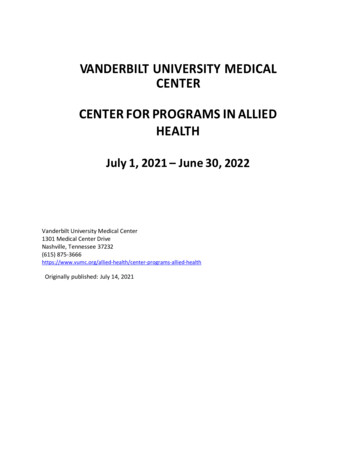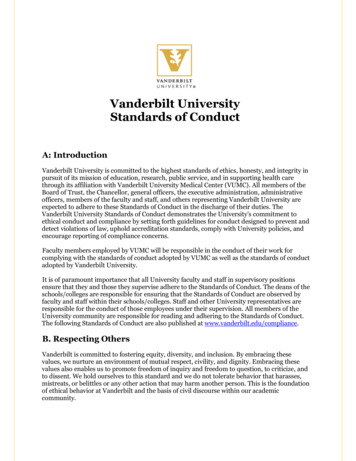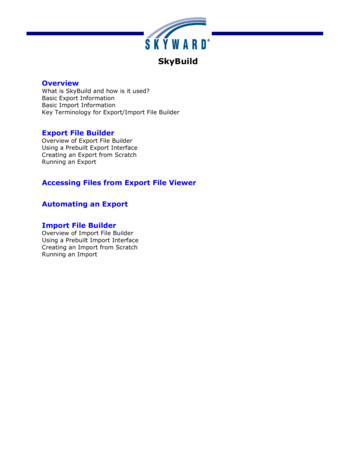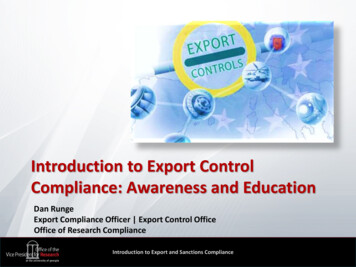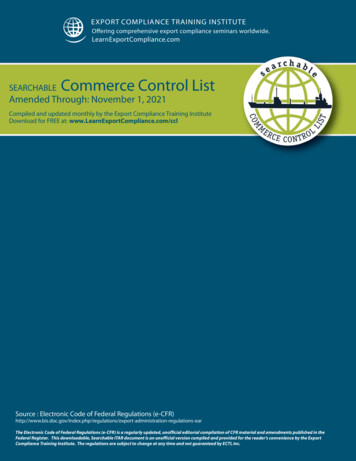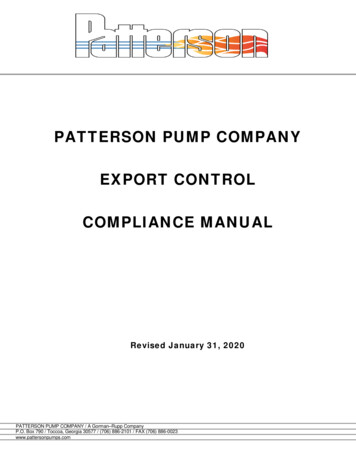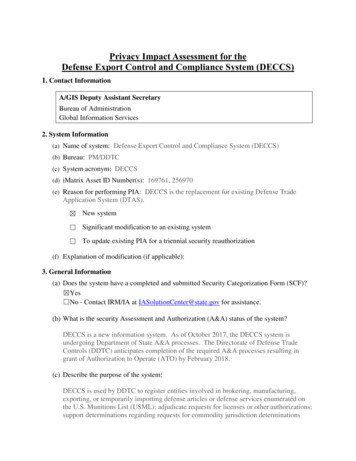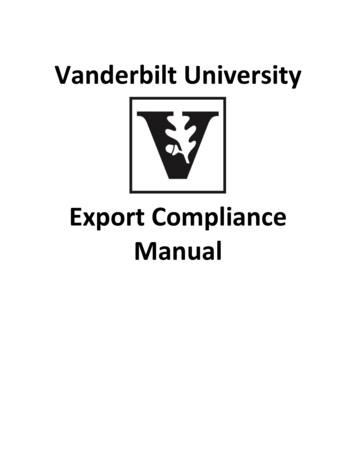
Transcription
Vanderbilt UniversityExport ComplianceManual
Table of Contents1REVISION HISTORY . 42DISCLAIMER . 43ACRONYMS . 44GLOSSARY . 45PURPOSE . 56SCOPE. 57OVERVIEW OF U.S. EXPORT CONTROL LAWS . 57.1OFFICE OF FOREIGN ASSETS CONTROL (OFAC).67.2EXPORT ADMINISTRATION REGULATIONS (EAR) .77.3INTERNATIONAL TRAFFIC IN ARMS REGULATIONS (ITAR) .77.4PENALTIES .87.4.1 VOLUNTARY SELF-DISCLOSURE . 87.5IMPORTANT EXPORT CONTROL EXCLUSIONS TO UNIVERSITIES .97.5.1 EDUCATIONAL INFORMATION EXCLUSION . 97.5.2 PUBLIC DOMAIN/PUBLICLY AVAILABLE EXCLUSION . 97.5.3 FUNDAMENTAL RESEARCH EXCLUSION (FRE): . 97.5.3.18FUNDAMENTAL RESEARCH DISQUALIFIERS . 10EXPORT CONTROL AT VANDERBILT UNIVERSITY . 108.1POLICY AND INSTITUTIONAL COMMITTMENT . 108.2ROLES AND RESPONSIBILITIES .118.2.1 VICE PROVOST FOR RESEARCH (VPR) . 118.2.2 ASSISTANT PROVOST OF RESEARCH OPERATIONS. 118.2.3 EXPORT CONTROL OFFICER (ECO) . 118.2.4 EXPORT CONTROL MANAGER (ECM) . 128.2.5 PRINCIPAL INVESTIGATOR (PI)/FACULTY MEMBER. 138.2.6 CENTRAL OFFICES . 138.2.7 DEPARTMENTS/UNITS . 148.3IMPACT ON UNIVERSITY ACTIVITIES . 148.3.1 RESEARCH (RI). 148.3.1.18.3.1.28.3.1.38.3.28.3.3RESTRICTED PARTIES SCREENING (RPS) . 17IMMIGRATION . 188.3.3.18.3.3.28.3.4EXPORT CONTROLLED RESEARCH . 14EXPORT CLASSIFICATION . 14INTELLECTUAL PROPERTY (IP) AND MATERIAL TRANSFER (MTA) . 17VISA DEEMED EXPORT QUESTIONNAIRE (VDEQ) . 19FOREIGN NATIONAL VISITORS (VIS). 19INTERNATIONAL TRAVEL (ITQ) . 208.3.4.1TRAVEL TO EMBARGOED OR SANCTIONED COUNTRIES . 20Vanderbilt Export Compliance ManualPage 2 of 40Last Revision March 26, 2018
8.3.4.28.3.4.38.3.4.48.3.5INTERNATIONAL SHIPMENTS . 238.3.5.18.3.5.28.3.5.38.3.68.3.78.3.8SHIPPING CHEMICALS, BIOLOGICAL AGENTS, OR TOXINS . 24DOMESTIC SHIPMENTS . 24END USE STATEMENT (EUS). 24LAB INVENTORY . 24PROCUREMENT AND DISBURSEMENTS. 24SPONSORED RESEARCH . 258.3.8.18.3.8.28.3.9TRAVEL HAND-CARRY OF VANDERBILT PROPERTY. 21TRAVEL PURPOSE AND RESTRICTED PARTIES . 22TRAVEL BEST PRACTICES . 22ANTI-BOYCOTT RESTRICTIONS. 25TROUBLESOME CLAUSES . 26ACCESS AND CONTROL PLANS. 268.3.9.18.3.9.28.3.9.38.3.9.4FACILITY ACCESS PLAN (FAP) . 27TECHNOLOGY CONTROL PLAN (TCP) . 27CONTROLLED UNCLASSIFIED INFORMATION / NIST 800-171 COMPLIANCE . 27DFARS 252.204-7012 / NIST 800-171 COMPLIANCE . 288.4EXPORT CONTROL LICENSE . 308.4.1 EXPORT CONTROL LICENSE APPLICATION . 308.4.2 LICENSE EXCEPTIONS . 318.5TRAINING .328.5.1 MANDATORY . 328.5.2 OPTIONAL . 328.5.2.18.5.2.2INSTRUCTOR LED TRAINING COURSES . 32ONLINE TRAINING . 328.5.3 OTHER TRAINING RESOURCES . 338.6RECORDKEEPING . 338.7INCIDENT REPORTING . 338.7.1 DISCIPLINARY ACTION . 348.7.2 EMPLOYEE PROTECTION . 348.8MONITORING AND AUDITING .348.9ADDITIONAL RESOURCES . 359APPENDICES . 359.19.29.39.49.5VANDERBILT UNIVERSITY EXPORT COMPLIANCE POLICY . 36ORGANIZATIONAL CHART . 37EXPORT CONTROL DECISION TREE . 38STANDARD OPERATING PROCEDURES (SOP) . 39EXPORT CONTROL BASIC EXPORT GUIDANCE FLYER .40Vanderbilt Export Compliance ManualPage 3 of 40Last Revision March 26, 2018
1 REVISION HISTORYRevision Number1.0DateMarch 29, 2018Description of ChangesCombination of Export ManagementSystem (EMS) and VEC Policies andProcedures manual2 DISCLAIMERThis Manual is not intended as, and should not be considered, formal legal advice.The Vanderbilt Export Compliance Office (VEC) is a resource to provide guidance and assistance forVanderbilt University on export compliance matters. Specific questions about export controlcompliance should be directed to VEC.Vanderbilt Export Compliance (VEC)615-343-2426 or t.edu/exportcompliance/All Vanderbilt University Medical Center requests should be directed to the VUMC Export Office.Students who rotate in or join a VUMC lab should contact VUMC Exports for assistance. For facultywith both University and Medical Center appointments, please contact VEC and/or VUMC Exports forassistance in determining the correct office.3 ACRONYMSBIS: Bureau of Industry and SecurityCCL: Commerce Control ListDDTC: Directorate of Defense Trade ControlsEAR: Export Administration RegulationsECAC: Export Control Advisory CommitteeECCN: Export Control Classification NumberECM: Export Control ManagerECO: Export Control OfficerEO: Empowered OfficialEUS: End-User StatementFAP: Facility Access PlanFRE: Fundamental Research ExclusionIT: Information technologyITAR: International Traffic in ArmsRegulationsITQ: International Travel QuestionnaireOFAC: Office of Foreign Assets ControlPI: Principal InvestigatorRPS: Restricted Parties ScreeningSHIP: International Shipment FormTCP: Technology Control PlanTMP: Temporary Export ExceptionUSML: United States Munitions ListVDEQ: Visa Deemed Export QuestionnaireVEC: Vanderbilt Export ComplianceVIS: Foreign National Visitor FormVPR: Vice Provost for Research4 GLOSSARYSee the VEC website for glossary and terms.Vanderbilt Export Compliance ManualPage 4 of 40Last Revision March 26, 2018
5 PURPOSEThe Vanderbilt University Export Compliance Manual (“Manual”) is intended is to provide guidance onU.S. Export Control laws and regulations, to identify key export compliance issues related to research,education, and all other activities conducted within a university setting, and to describe how theVanderbilt University Export Compliance Policy (“institutional policy”) is implemented. See VANDERBILTUNIVERSITY EXPORT COMPLIANCE POLICY. The procedures outlined herein serve as VanderbiltUniversity’s program of internal controls, safeguards, and educational measures designed to minimizerisk of potential violations of all applicable export control laws and regulations and institutional policy.The U.S. export control agencies place responsibility on the University to understand and ensurecompliance with export control laws and regulations.6 SCOPEVanderbilt University’s institutional policy and procedures outlined in this Manual apply to Universitypersonnel, defined as university faculty and staff. Postdoctoral fellows and students are also expectedto comply with U.S. laws and regulations.7 OVERVIEW OF U.S. EXPORT CONTROL LAWSThe U.S. export control regulations were designed to protect U.S. national security, prevent theproliferation of weapons of mass destruction, advance U.S. foreign policy, support regional stability,protect human rights, maintain U.S. economic competitiveness, and implement anti-terrorism andcrime controls.The main concerns of U.S. export controls are classification, destination, end-user, and end-use.ClassificationDestinationEnd-UserEnd-Use What is being exported? Item, software, technical data? Military or dual-use? Classification Where is it going? Sanctioned or embargoed country? Who will receive it? Denied or blocked party? Military end-user? Weapons of mass destruction proliferator? What will they do with it? Prohibited end-use? Biological chemical, nuclear weapons?Vanderbilt Export Compliance ManualPage 5 of 40Last Revision March 26, 2018
To understand export control regulations, it is important to understand: what is an export? An exportis any transfer of an item or information to a foreign country or to a foreign national located within theUnited States. This transmission can be oral, written, visual disclosure, shipment, hand-carrying itemswhile traveling, or providing technical assistance. The three principal agencies that regulate exportsfrom the United States are:Departmentof TreasuryOffice of ForeignAssets Control(OFAC)Embargoesand SanctionsDenied trationRegulations (EAR)CommerceControl List(CCL)Dual UseItemsDepartmentof StateInternationalTraffic in ArmsRegulations(ITAR):U.S. MunitionsList (USML)DefenseArticles andServicesThere are other U.S. federal agencies, such as Customs and Border Protection (CBP), the NuclearRegulatory Commission (NRC) and the U.S. Department of Defense (DoD), just to name a few, thathave jurisdiction over certain items and/or activities subject to export controls.These agencies generally restrict the export of certain types of products and services based on thedestination of the export. The U.S. Government tightly regulates the export not only of certain types ofequipment and components, but also of technology. Technology includes technical data, such asblueprints and manuals, as well as design services, including testing and the transfer of “knowledge”,and training. In addition, the U.S. maintains economic embargoes against a number of countries whosegovernments consistently violate human rights or act in support of global terrorism. Such embargoesbar most transactions by U.S. persons with these countries.7.1 OFFICE OF FOREIGN ASSETS CONTROL (OFAC)The Office of Foreign Assets Control (OFAC) is within the U.S. Department of Treasury. OFAC isresponsible for maintaining and enforcing U.S. economic and trade sanctions. Trade sanction programsexists against targeted foreign countries and regimes, terrorists, international narcotics traffickers,those engaged in activities related to the proliferation of weapons of mass destruction, and otherthreats to the national security, foreign policy or economy of the United States. The level of restrictionor prohibition of an existing sanction program is influenced by foreign relations and national security.The OFAC sanction programs can be generalized into three categories:Vanderbilt Export Compliance ManualPage 6 of 40Last Revision March 26, 2018
1) Comprehensive—In general, under comprehensive sanctions programs, most all interactions andactivities are prohibited, including exporting to, importing from, financial transactions, and/orproviding services of any kind. While essentially all interactions with comprehensively sanctionedcountries are prohibited, there is an exception for informational materials that allows certaintransactions to occur.2) Limited—Under limited sanctions programs only some activities (e.g., importation of items) areprohibited.3) Regime or List-Based—Regime or List-Based sanctions are targeted against specific individualsidentified by the Treasury Department and referred to as Specially Designated Nationals (SDNs) orare targeted against specific groups of people usually associated with a governmental body orregime.For an updated list of currently sanctioned countries and programs see the OFAC Sanctions Programsand Country Information. In addition, export.gov maintains a searchable consolidated screening listingof groups and individuals that are blocked or denied.7.2 EXPORT ADMINISTRATION REGULATIONS (EAR)The Export Administration Regulations are administered by the U.S. Department of Commerce, Bureauof Industry and Security (BIS), which regulates the export of “dual use” items. Dual use items haveprimarily commercial purposes but may have potential military or space applications. Examples of dualuse items may include chemicals, microorganisms, laboratory equipment, computers and software.In general, any physical item made in the United States will be subject to the EAR unless the itemqualifies for an exemption, See Section 8.4.2, or is under another jurisdiction, such as ITAR. EARtechnical data is also controlled, such as blueprints, plans, models, tables, designs, and manuals. Whilealmost every item located within the U.S. is controlled on the EAR, most do not require an exportlicense.Items and technical data that are subject to the EAR are listed on the Commerce Control List (CCL).Items controlled are categorized by an Export Control Classification Number (ECCN) based on 10categories and 5 product groups. While ITAR items are controlled to all foreign countries and foreignnationals, EAR items are controlled to specific countries and vary depending on the reasons for control.The CCL is found in Supplement 1 to part 774 of the EAR.7.3 INTERNATIONAL TRAFFIC IN ARMS REGULATIONS (ITAR)The International Traffic in Arms Regulations (ITAR) are administered and implemented by the U.S.Department of State, Directorate of Defense Trade Controls (DDTC), in conjunction with theDepartment of Defense, to regulate defense exports.Under the ITAR, DDTC administers the export of defense articles and defense services. A defensearticle is any item or technical data that is specifically designed, developed, configured, adapted, ormodified for military or space use. This can include models, mockups, or data for parts andVanderbilt Export Compliance ManualPage 7 of 40Last Revision March 26, 2018
components that make up the defense articles. For example, military aircraft are ITAR controlled aswell as the engines and navigational controls even though such components may have otherapplications. A defense service is providing assistance to foreign persons, whether in the U.S. orabroad, in the design or development of defense articles. This service may be in the form of providingtraining, engineering, production, testing, repair, maintenance, operation, destruction, or processing ofa defense article.ITAR controlled defense articles and services are listed on the U.S. Munitions List (USML). The USMLlists 21 categories and a detailed listing can be found in 22 C.F.R 121.1.7.4 PENALTIESExport of a controlled item without proper authorization (license or license exception) may result incriminal and/or civil penalties for the university and/or the responsible individual (e.g. the PI). Thisincludes exports violating the terms of an export license. In some cases, multiple violations of relatedrestrictions may apply to a single export, resulting in extremely large fines. Penalties may includeseizure of items, loss of export privileges, debarment from participating in future federal contracts, orjail time. It is important to note that deemed export violations are subject to the same federalpenalties as physical exports.OFACEARITARCriminal PenaltiesUp to 1,000,000 per violationand up to 20 years imprisonmentUp to 1,000,000 per violationand up to 20 years imprisonmentUp to 1,000,000 per violationand up to 20 years imprisonmentCivil PenaltiesUp to 250,000 per violationUp to 250,000 per violationUp to 500,000 per violation7.4.1 VOLUNTARY SELF-DISCLOSUREVoluntary self-disclosure of a violation can be a mitigating factor in penalty assessment, reducingpenalties up to 50%. In most cases certain conditions apply, such as implementing or improving acompliance program. Factors which potentially affect penalty assessment include: First time offenderPresence of a compliance programRemediation steps takenCause of the violation; e.g. misapplication of laws, mistake of factWillful or intentional violationPenalties are subject to change. For the latest penalties please consult the relevant agency.Vanderbilt Export Compliance ManualPage 8 of 40Last Revision March 26, 2018
7.5 IMPORTANT EXPORT CONTROL EXCLUSIONS TO UNIVERSITIESMost of the work done at Vanderbilt is excluded or exempted from export controls under theEducational Information, Public Domain, and Fundamental Research Exclusions. If the work or researchmeets the criteria for one of these exclusions, then it is not subject to export control.7.5.1 EDUCATIONAL INFORMATION EXCLUSIONEducational information is referred to in 15 CFR §734.9(b)(iii) as information normally taught orreleased in academic catalog-listed courses or in teaching labs associated with those courses and notsubject to export controls.7.5.2 PUBLIC DOMAIN/PUBLICLY AVAILABLE EXCLUSIONInformation that is already published or is in the public domain is considered public information and asprovided for under the federal regulations (15 CFR §734.7) is NOT subject to export controls. Examplesof information in the public domain include: Books, newspapers, pamphlets Publicly available technology and software Information presented at conferences, meetings and seminars open to the public Information included in published patents Websites freely accessible by the publicThis exclusion does not apply to encrypted software, to information if there is reason to believe it maybe used for weapons of mass destruction, or where the U.S. government has imposed access ordissemination controls as a condition of funding.7.5.3 FUNDAMENTAL RESEARCH EXCLUSION (FRE):Fundamental research is basic or applied research in science, engineering, or mathematics, the resultsof which ordinarily are published and shared broadly within the scientific community, and for whichthe researchers have not accepted restrictions for proprietary or national security reasons. TheFundamental Research Exclusion (FRE) is an exclusion from export controls that allows university-basedresearch that might otherwise be controlled for export by either the EAR or ITAR to be excluded (15CFR §734.8 and 22 CFR §120.11(8), respectively).Because there is generally an intent and ability to publish research results or make available in thepublic domain, most university research is considered to be fundamental and is excluded from exportcontrols under the FRE. However, it is important to note that not everything qualifies for the FRE.Does Not QualifyTangible (physical) itemsInput information (work done prior)ITAR defense servicesInternational ShipmentsResearch conducted outside the U.S.Does QualifyResearch data and resultsSoftwareVanderbilt Export Compliance ManualPage 9 of 40Last Revision March 26, 2018
Researchers should note that specifically under the ITAR, the FRE can only be utilized at an accreditedinstitution of higher learning in the United States.7.5.3.1 FUNDAMENTAL RESEARCH DISQUALIFIERSThe following negate the ability to use the FRE and may subject the research to the full weight ofexport control laws and regulations: Contractual restrictions ono Publication (requires sponsor approval)o Participation based on nationalityo Dissemination (limits who can access) If the PI has made a “side deal” with the sponsor Activity with an embargoed or sanctioned country Activity with restricted or denied partiesWhen such disqualifiers are present, the FRE cannot be used and the research becomes subject toexport controls.8 EXPORT CONTROL AT VANDERBILT UNIVERSITY8.1 POLICY AND INSTITUTIONAL COMMITTMENTVanderbilt University is a teaching and research environment dedicated to openness and the freeexchange of research within the U.S. and internationally. A central principle of the University is that theteaching and research environment should be open so that ideas can be published and exchangedfreely among faculty and students. This is an integral part of Vanderbilt University’s research mission;however, the University recognizes that certain activities may be subject to federal export control and,therefore, is committed to complying with U.S. laws and regulations. It is the policy of VanderbiltUniversity to comply with all applicable United States export-control laws and regulations, SeeVANDERBILT UNIVERSITY EXPORT COMPLIANCE POLICYThe Vanderbilt University Export Compliance Office (VEC) is committed to maintaining an effective andcomprehensive export compliance program that can readily adapt to an evolving regulatoryenvironment. It is dedicated to providing assistance to University researchers in their export-relatedactivities. It is committed to acting as a centralized resource to maintain a high level of compliancewhile keeping administrative burden low.In deference to the diverse and numerous academic and research areas within Vanderbilt Universityand in efforts to maintain consistency and simplicity, all the colleges, schools, programs, initiatives,departments, centers, and institutes shall be referred to as “Unit” unless specified otherwise withinthis Manual.Vanderbilt Export Compliance ManualPage 10 of 40Last Revision March 26, 2018
8.2 ROLES AND RESPONSIBILITIESThe U.S. export control agencies place the responsibility on universities and their community membersto understand and comply with the regulations which control the transfer or distribution of thesetechnologies. By taking proactive steps, members of the community protect themselves, theirresearch, and Vanderbilt University. All faculty and staff are responsible for ensuring exportcompliance. Postdoctoral fellows and students are also expected to comply with U.S. laws andregulations.8.2.1 VICE PROVOST FOR RESEARCH (VPR)The Vice Provost for Research (VPR) is the Empowered Official (EO) for the export compliance programat Vanderbilt University. In this capacity, the VPR has the authority to represent the University toexternal agencies, including, but not limited to, registration, licensing, classification requests, andvoluntary disclosures. The VPR may delegate such authority to appropriate parties as he/she seesfit. The VPR may become involved with investigations of noncompliance with export control laws andinstitutional policy and make recommendations and determinations regarding institutional disciplinaryactions.8.2.2 ASSISTANT PROVOST OF RESEARCH OPERATIONSThe Assistant Provost of Research Operations oversees the Sponsored Programs Administration (SPA)office and represents the institution in sponsored research agreements. He or she will provideguidance for the institutional export compliance program and may act as a liaison with the VPR. TheAssistant Provost will be involved in reporting incidents of information security, investigations ofnoncompliance, and may be the delegated signatory for access and control plans.8.2.3 EXPORT CONTROL OFFICER (ECO)The Export Control Officer (ECO) reports to the Assistant Provost for Research. He or she has directday-to-day responsibility for administering all aspects of Vanderbilt University’s export complianceprogram.The ECO has the delegated authority to apply for export control licenses on behalf of the Universityand to represent the University to regulatory authorities in all matters pertaining to export controlcompliance. The ECO is responsible for developing and implementing procedures set forth in thisManual. Specifically,1) Leads and manages the overall procedures and protocols to ensure compliance with allapplicable export control laws, regulations and institutional policy;2) Directs and delegates day-to-day operation, administration, and communication of the exportcompliance program:a. Transactional database and record-keepingb. Export reviews oni. Research agreementsii. Restricted parties screeningiii. Deemed exportsVanderbilt Export Compliance ManualPage 11 of 40Last Revision March 26, 2018
3
The Vanderbilt Export Compliance Office (VEC) is a resource to provide guidance and assistance for Vanderbilt University on export compliance matters. Specific questions about export control compliance should be directed to VEC. Vanderbilt Export Compliance (VEC) 615-343-2426 or 615-343-6070 vec@vanderbilt.edu
